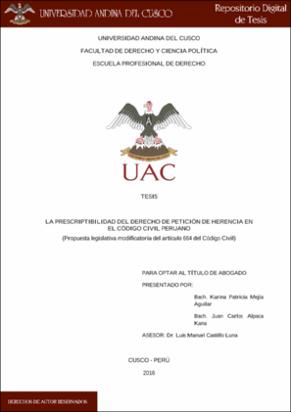| dc.contributor.advisor | Castillo Luna, Luis Manuel | |
| dc.contributor.author | Mejia Aguilar, Karina Patricia | |
| dc.contributor.author | Alpaca Kana, Juan Carlos | |
| dc.date.accessioned | 2016-12-05T15:27:06Z | |
| dc.date.available | 2016-12-05T15:27:06Z | |
| dc.date.issued | 2016-07-21 | |
| dc.identifier.uri | https://hdl.handle.net/20.500.12557/478 | |
| dc.description.abstract | El presente estudio de investigación parte del análisis interpretativo del art. 664 de CC peruano, el cual parte por establecer que supuestos previstos en acción petitoria son imprescriptibles, esto debe, entenderse que la imprescriptibilidad a la que alude este dispositivo legal debe entenderse, primero que no es “extintiva” o liberatoria porque el derecho personal como heredero es perpetuo, no se extingue por efecto del transcurso del tiempo. De ahí que, tras exponer en detalle la propuesta en dicho precepto legal, en ese sentido, se ha considerado, sin duda, la enorme importancia de esta acción, en base al derecho de toda persona de poder contar con el patrimonio que le corresponde y que, por diversas razones, no posee, luego de una sucesión. Pero, lo reiteramos, más allá de la importancia de esta acción, lo que correspondería es formularnos de si acaso se podría interpretar que en la eventualidad de que el artículo 664 del CC no hubiese señalado la imprescriptibilidad de la acción petitoria de herencia, dicha acción seria imprescriptible, más aun, dicha regla general de imprescriptibilidad es aplicado a todo los supuestos previstos en el art. 664 teniendo en consideración la existencia de su derecho en cada pretensión. Aquí tampoco cabe duda de que, independientemente de la gravedad del tema controvertido, la respuesta negativa se impone, pues fuera de cualquier otra consideración jurídica, no tendríamos ninguna razón absolutamente contundente la imprescriptibilidad de dicha acción, a menos que la ley –como en efecto, lo ha hecho– señale su carácter imprescriptible. Entonces de no haberse precisado en la ley su carácter imprescriptible, tendríamos que recurrir a analizar cuál de los plazos generales de prescripción, establecidos por el artículo 2001 del Código Civil, le sería aplicable, esto último para una mejor tutela de derechos y seguridad jurídica. | es_PE |
| dc.description.abstract | This research study of the art interpretive analysis. 664 Peruvian CC, which part to establish that cases provided for in petitoria action are imprescriptible, it should be understood that the Non-referred to by this legal device to be understood, first it is not “statute“ or liberatory because the personal right as heir is perpetual, is not extinguished by the effect over time. Thus, after describing in detail the proposal in that legal precept, in that sense, it has been considered undoubtedly the enormous importance of this action, based on the right of everyone to have the rightful heritage and who, for various reasons it does not own, after a succession. But, I reiterate, beyond the importance of this action, which would correspond is ask ourselves whether anything could be interpreted that in the event that Article 664 of the CC had not indicated the applicability of the petitoria action of inheritance, such action imprescriptible would, moreover, that general rule of applicability is applied to all the cases provided for in art. 664 taking into account the existence of the right in each claim. Here it is also clear that, regardless of the severity of the controversial issue, the negative response is necessary, because outside of any legal consideration, we would have no absolutely compelling reason the applicability of such action, unless the law, as indeed , it has done- point their imprescriptible character. Then his imprescriptible not been specified in the law, we would have to resort to analyze which of the general limitation period established by Article 2001 of the Civil Code would apply, the latter for better protection of rights and legal certainty. | en_US |
| dc.description.uri | Tesis | es_PE |
| dc.format | application/pdf | es_PE |
| dc.language.iso | spa | es_PE |
| dc.publisher | Universidad Andina del Cusco | es_PE |
| dc.rights | info:eu-repo/semantics/openAccess | es_PE |
| dc.rights.uri | https://creativecommons.org/licenses/by-nc-nd/2.5/pe/ | es_PE |
| dc.source | Universidad Andina del Cusco | es_PE |
| dc.source | Repositorio Institucional - UAC | es_PE |
| dc.subject | Herencia | es_PE |
| dc.subject | Petición | es_PE |
| dc.subject | Prescriptibilidad | es_PE |
| dc.title | La prescriptibilidad del derecho de petición de herencia en el código civil peruano (Propuesta legislativa modificatoria del artículo 664 del Código Civil) | es_PE |
| dc.type | info:eu-repo/semantics/bachelorThesis | es_PE |
| thesis.degree.name | Abogado | es_PE |
| thesis.degree.grantor | Universidad Andina del Cusco. Facultad de Derecho y Ciencia Política | es_PE |
| thesis.degree.level | Titulo Profesional | es_PE |
| thesis.degree.discipline | Derecho | es_PE |


